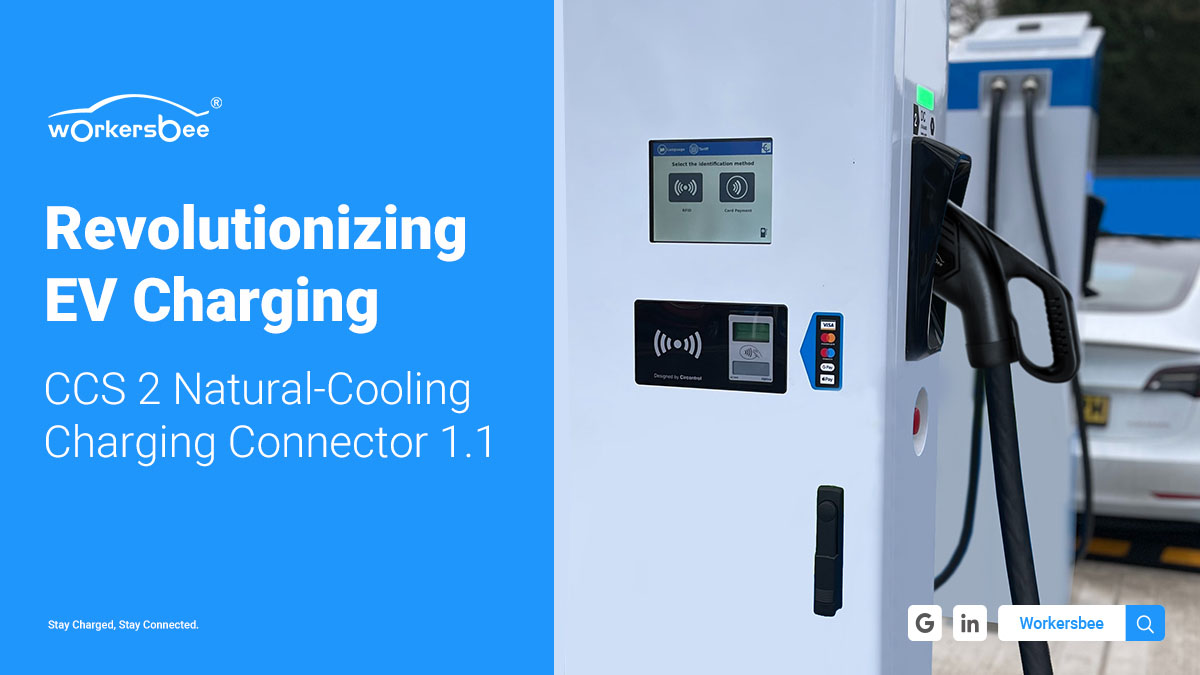 Everything You Need to Know About Workersbee's 375A Naturally Cooled CCS2 EV Charging Cable
Everything You Need to Know About Workersbee's 375A Naturally Cooled CCS2 EV Charging Cable
Apr 10, 2025
As the electric vehicle (EV) industry evolves, the demand for efficient and reliable high-power charging solutions continues to grow. With more vehicles requiring faster charging and higher currents, cable performance becomes a critical factor in system design. One key question many EV infrastructure planners face is: Can a naturally cooled cable handle high current loads without active cooling systems? Workersbee's 375A CCS2 EV charging cable provides a clear answer.
Built for the Demands of Fast Charging
The Workersbee G1.1 CCS2 EV charging cable is rated for 375A and features a naturally cooled design, eliminating the need for complex thermal systems like fans or liquid-based cooling. This cable is designed to meet the requirements of fast-charging networks that aim for simplicity, cost-efficiency, and long-term reliability.
Ideal use cases include highway charging stations, urban commercial charging infrastructure, and large EV fleet depots. Natural cooling also means reduced maintenance and fewer moving parts, which helps operators manage long-term operational costs more effectively.
The cable’s structure uses a 4×60mm² conductor layout, supported by a matching 120mm² socket during testing. This balanced configuration ensures current delivery remains consistent even during extended high-load sessions. By reducing unnecessary system complexity, the cable offers an attractive option for operators focused on uptime and cost savings.
Independent Testing and Thermal Performance
To verify performance, the cable underwent a temperature rise test conducted by a third-party laboratory. The test simulated real-world current loads of 375A, 400A, 450A, and 500A under ambient temperatures ranging from 28.8°C to 33.4°C. The goal was to assess how long the cable could maintain each current before exceeding a temperature rise of 50K at the terminals.
Test Results Overview:
Test Current
Max Temp (DC+)
Temp Rise (ΔT)
Time to Exceed 50K
375A
69.6°C
36.9K
No overheating
400A
76.5°C
43.1K
No overheating
450A
83.6°C
50.6K
70 minutes
500A
79.1°C
50.3K
41 minutes
Up to 400A, the cable maintained stable temperatures well below the 50K rise limit. Even at higher currents, it demonstrated significant thermal resilience by sustaining performance for extended durations. For applications that experience occasional power spikes, this performance adds a valuable layer of security.
What This Means for Operators
For charging station operators and infrastructure integrators, consistent thermal stability translates to greater uptime and safety. The G1.1 CCS2 cable can handle continuous operation at 375A and 400A without approaching critical temperature levels. This ensures that charging sessions remain efficient even during high traffic or peak demand hours.
The added ability to manage 450A and 500A for shorter periods offers valuable flexibility. Whether accommodating unexpected surges or managing simultaneous charging sessions, this capacity gives operators more options without the need to overbuild their systems.
Additionally, natural cooling offers long-term operational advantages. There is no need for pumps, fans, or sensors, which means fewer points of failure and easier servicing. For outdoor installations or locations with limited ventilation, this can simplify deployment and reduce permitting or installation challenges.
Comparing with Other Market Options
Many EV cables in the 375A class require active cooling or operate very close to their maximum thermal limits. This often leads to increased system complexity and cost. Workersbee's solution avoids these challenges with a naturally cooled design that delivers equivalent or better performance.
Through optimized conductor materials, carefully engineered interfaces, and robust insulation, the cable minimizes internal heat generation. These design choices help extend cable life and reduce the frequency of maintenance or replacements.
In contrast, some competitors rely on over-specifying components or adding bulkier cooling systems, which can make integration with compact charging cabinets more difficult. Workersbee’s approach strikes a better balance between high performance and streamlined implementation.
Aligned with Scalable Infrastructure
As EV charging expands globally, operators seek scalable and dependable components. The G1.1 CCS2 cable supports that growth with features tailored to long-term deployment:
•Stable operation at 375A and 400A
•Short-term support for 450A and 500A
•No need for active cooling systems
•Reliable performance across a variety of installation environments
•Minimal maintenance and easy integration into compact charging enclosures
These features make it a practical choice for infrastructure planners looking to reduce operational risk while supporting faster charging speeds.
It’s also worth noting that this product aligns with evolving international standards for DC charging safety and performance. As more countries adopt strict testing and compliance benchmarks, having a cable that has undergone independent testing provides added peace of mind for compliance teams.
A Forward-Looking Investment in EV Charging
Selecting the right charging cable is about more than current ratings—it’s about consistency, durability, and cost-effective integration. Workersbee’s naturally cooled CCS2 EV charging cable represents a thoughtful approach to performance and practicality.
By combining thermal efficiency with simple operation, it delivers a balanced solution for today’s high-power charging needs and tomorrow’s EV growth. For developers, OEMs, and site operators seeking dependable charging hardware, it offers a proven, ready-to-deploy option that fits into scalable infrastructure plans.
And as EV adoption increases and expectations shift toward faster, more reliable charging, solutions like this will become essential building blocks for the next generation of charging networks.
Read More

 Everything You Need to Know About Workersbee's 375A Naturally Cooled CCS2 EV Charging Cable
Everything You Need to Know About Workersbee's 375A Naturally Cooled CCS2 EV Charging Cable